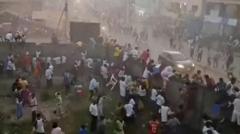In a horrific event that unfolded during a football match in Guinea, human rights organizations have reported that more than 135 fans, predominantly children, lost their lives in a stadium crush, significantly surpassing the government’s official death toll of 56. As investigations commence, the military government has cautioned against rumors and misinformation, urging the public to await official reports.
Tragedy Strikes as Over 135 Die in Guinea Football Stadium Crush

Tragedy Strikes as Over 135 Die in Guinea Football Stadium Crush
Rights groups report devastating toll from chaotic scene following match.
Human rights groups in Guinea have voiced their grave concerns over the staggering death toll following a crush at a stadium in Nzérékoré on Sunday, estimating that at least 135 people, mainly children, perished in the chaos that ensued after a controversial refereeing decision during the match. This horrific estimate far exceeds the official count, which currently stands at 56, and underscores the conflicting narratives emerging in the wake of this tragedy. Moreover, over 50 individuals remain unaccounted for, prompting a widespread community search.
In response to the growing outcry and clamor for accountability, Justice Minister Yaya Kaïraba Kaba has initiated a judicial inquiry into the incident and has warned that anyone spreading non-verified information would face arrest. Witness reports indicate that police used tear gas to manage crowds attempting to escape, which exacerbated the situation. Rights groups contend that the chaos stemmed from poor organizational practices by match authorities and the ruling military junta, who organized the match in honor of President Mamady Doumbouya.
Prime Minister Mamadou Oury Bah declared three days of national mourning for the victims, asserting the government's collective sorrow. Government spokesman Ousmane Gaoual reflected on the ambiguity of the reported figures, stating that the government acknowledges the provisional nature of its death toll without denying the emotional gravity of the situation. Local journalist reports highlight the desperate conditions at the stadium, where a singular, narrow exit became a deadly bottleneck as thousands sought escape.
This incident casts a grim shadow over Guinea, which, like several other African nations, faces bans from hosting international football matches due to safety concerns. With these events unfolding, many in the nation are left grappling with grief and seeking justice for the lives lost in the terrifying crush.
In response to the growing outcry and clamor for accountability, Justice Minister Yaya Kaïraba Kaba has initiated a judicial inquiry into the incident and has warned that anyone spreading non-verified information would face arrest. Witness reports indicate that police used tear gas to manage crowds attempting to escape, which exacerbated the situation. Rights groups contend that the chaos stemmed from poor organizational practices by match authorities and the ruling military junta, who organized the match in honor of President Mamady Doumbouya.
Prime Minister Mamadou Oury Bah declared three days of national mourning for the victims, asserting the government's collective sorrow. Government spokesman Ousmane Gaoual reflected on the ambiguity of the reported figures, stating that the government acknowledges the provisional nature of its death toll without denying the emotional gravity of the situation. Local journalist reports highlight the desperate conditions at the stadium, where a singular, narrow exit became a deadly bottleneck as thousands sought escape.
This incident casts a grim shadow over Guinea, which, like several other African nations, faces bans from hosting international football matches due to safety concerns. With these events unfolding, many in the nation are left grappling with grief and seeking justice for the lives lost in the terrifying crush.




















